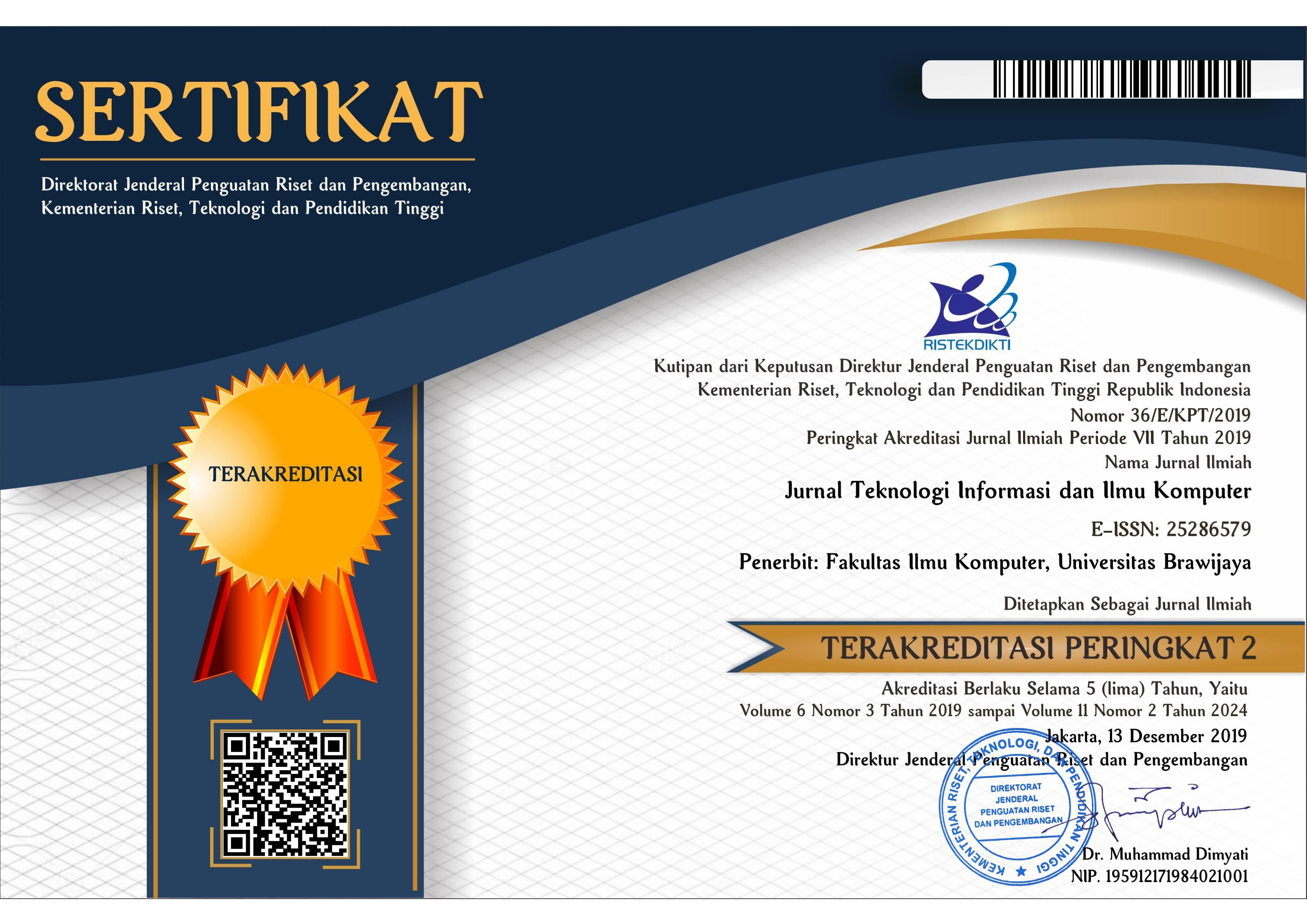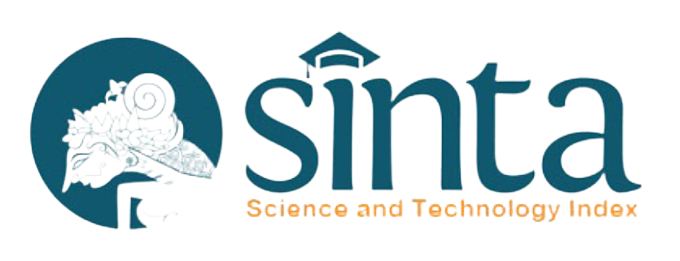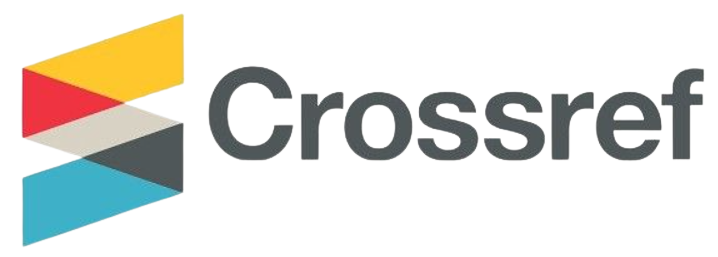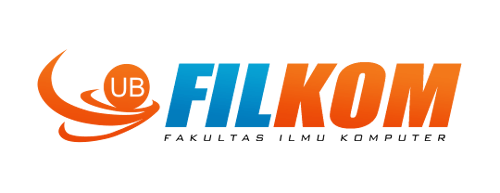Penggunaan Gamitifikasi pada Massive Open Online Course (MOOC)
DOI:
https://doi.org/10.25126/jtiik.0811689Abstrak
Pada era Revolusi Industri 4.0 Gamifikasi dan Massive Open Online Course (MOOC) merupakan fenomena baru dalam pembelajaran terbuka dan dikenal sebagai strategi yang baik untuk meningkatkan kualitas pendidikan. Namun demikian, MOOC memiliki dua kelemahan utama: pertama, kurangnya pemahaman untuk mengetahui sasaran pribadi; dan kedua, tingkat penyelesaian yang rendah dibandingkan dengan jumlah pendaftaran ke MOOCs. Untuk dapat mengatasi dua kelemahan tersebut peneliti mengusulkan pemanfaatan Gamifikasi. Dalam tulisan ini akan diuraikan berbagai penelitian yang berkaitan dengan Gamifikasi dan MOOC. Metodologi penelitian ini menggunakan pendekatan studi literatur. Hasilnya diketahui bahwa MOOC tidak memerlukan tingkat penyelesaian penuh seperti kursus tradisional yang biasanya dianggap sebagai keberhasilan. Selain itu gamifikasi dapat meningkatkan efektifitas MOOC untuk dapat mengatasi masalah utama dalam penerapannya melalui pengguanaan elemen-elemen penting dalam gamifikasi.
Abstract
Since the beginning of the Industrial Revolution 4.0 Gamification and the Massive Open Online Course (MOOC) is a new phenomenon in open learning and is known as a good strategy to improve the quality of education. However, the MOOC has two main disadvantages: first, lack of understanding to know personal goals; and second, the completion rate is low compared to the number of registrations to MOOCs. To be able to overcome these two weaknesses, researchers will propose the use of Gamification. In this paper various studies relating to Gamification and MOOC will be described. The methodology of this research uses a qualitative approach with emphasis on data analysis. The result is that the MOOC does not require a full level of completion like a traditional course which is usually considered a success. In addition, gamification can increase the effectiveness of the MOOC to be able to overcome the main problems in its application through the use of important elements in gamification
Downloads
Referensi
ANTONACI, A., KLEMKE, R., STRACKE, C.M. and SPECHT, M., 2017. Gamification in MOOCs to enhance users’ goal achievement. IEEE Global Engineering Education Conference, EDUCON, (April), pp.1654–1662.
BUDGEREIT, L., 2015. Gamifying a PhD taught module: A Journey to Phobos and Deimos. 1ST-Africa Conference IEEE, pp.1–9.
DAVIDSSON, O., PEITZ, J. and BJORK, S., 2004. Game Design Patterns for Mobile Games. 91, pp.399–404.
DETERDING, S. and DIXON, D., 2011. From Game Design Elements to Gamefulness : Defining Gamification From Game Design Elements to Gamefulness : Defining “ Gamification ”. (March 2014).
GENÉ, O.B., NÚÑEZ, M.M. and BLANCO, Á.F., 2014. Gamification in MOOC: Challenges, Opportunities and Proposals for Advancing MOOC Model. Proceedings of the 2nd International Conference on Technological Ecosystems for Enhancing Multiculturality (TEEM).
GOLLWITZER, P.M., 2014. Goal Achievement : The Role of Intentions. (January 1993).
HAMARI, J., KOIVISTO, J. and SARSA, H., 2014. Does gamification work? - A literature review of empirical studies on gamification. Proceedings of the Annual Hawaii International Conference on System Sciences, pp.3025–3034.
IQBAL, S., ZANG, X., ZHU, Y., CHEN, Y.Y. and ZHAO, J., 2015. On the impact of MOOCs on engineering education. In: Proceedings of the 2014 IEEE International Conference on MOOCs, Innovation and Technology in Education, IEEE MITE 2014.
KAPLAN, A.M. AND HAENLEIN, M., 2016. Higher education and the digital revolution: About MOOCs, SPOCs, social media, and the Cookie Monster. Business Horizons, [online] 59(4), pp.441–450. Available at: <http://dx.doi.org/10.1016/j.bushor.2016.03.008>.
KHALIL, M., WONG, J., DE KONING, B., EBNER, M. and PAAS, F., 2018. Gamification in MOOCs: A review of the state of the art. IEEE Global Engineering Education Conference, EDUCON, 2018-April(April), pp.1629–1638.
KIZILCEC, R.F. and PIECH, C., 2013. Deconstructing Disengagement: Analyzing Learner Subpopulations in Massive Open Online Courses.
KRAUSE, M., MOGALLE, M., POHL, H. and WILLIAMS, J.J., 2015. A Playful Game Changer: Fostering Student Retention in Online Education with Social Gamification. In: Proceedings of the second ACM Conference on Learning @ Scale (L@S’15).
LANDERS, R.N. and ARMSTRONG, K.N.B.C.C.B., 2015. Gamification in Education and Business. Springer International Publishing.
LIYANAGUNAWARDENA, T.R., ADAMS, A.A. and WILLIAMS, S.A., 2013. MOOCs : A systematic study of the published literature 2008-2012 | Liy ... MOOCs : A systematic study of the published literature 2008-2012 | Liy ... Method Data Collection. The International Review of Research in Open and Distributed Learning, 14(3), pp.202–227.
MAZARAKIS, A., 2015. Using gamification for technology enhanced learning: The case of feedback mechanisms. Bulletin of the Technical Committee on Learning Technology.
MESQUITA, M.A.A., TODA, A.M. and BRANCHER, J.D., 2015. BrasilEduca - An open-source MOOC platform for Portuguese speakers with gamification concepts. In: Proceedings - Frontiers in Education Conference, FIE.
METAWAA, M. and BERKLING, K., 2016. Personalizing Game Selection for Mobile Learning - With a View Towards Creating an Off-line Learning Environment for Children. 1(Csedu), pp.306–313.
MOHAMED, A. and YOUSEF, F., 2014. What Drives a Successful MOOC ? An Empirical Examination of Criteria to Assure Design Quality of MOOCs.
MORA, A., RIERA, D., GONZALEZ, C. and ARNEDO-MORENO, J., 2015. A Literature Review of Gamification Design Frameworks. VS-Games 2015 - 7th International Conference on Games and Virtual Worlds for Serious Applications.
MORALES, M. and AMADO-SALVATIERRA, H.R., 2015. Learning Technology for Education in Cloud. [online] 533, pp.139–149. Available at: <http://link.springer.com/10.1007/978-3-319-22629-3>.
NAH, F.F., ZENG, Q. and TELAPROLU, V.R., n.d. Gamification of Education : A Review of Literature. pp.401–409.
RAMÍREZ-DONOSO, L., ROJAS-RIETHMULLER, J.S., PÉREZ-SANAGUSTÍN, M., NEYEM, A. and ALARIO-HOYOS, C., 2017. MyMOOCSpace: A cloud-based mobile system to support effective collaboration in higher education online courses. Computer Applications in Engineering Education, 25(6), PP.910–926.
REICH, J., 2016. Learner Intention Recasts ‘Low’ MOOC Completion Rates. [online] HarvardX. Available at: <https://harvardx.harvard.edu/news/learner-intention>.
SARAGURO-BRAVO, R.A., JARA-ROA, D.I. and AGILA-PALACIOS, M., 2016. Techno-instructional application in a MOOC designed with gamification techniques. In: 2016 3rd International Conference on eDemocracy and eGovernment, ICEDEG 2016.
SEABORN, K. and FELS, D.I., 2015. Gamification in theory and action: A survey. International Journal of Human Computer Studies, 74, pp.14–31.
STAUBITZ, T., WILLEMS, C., HAGEDORN, C. and MEINEL, C., 2017. The gamification of a MOOC platform. IEEE Global Engineering Education Conference, EDUCON, (January), pp.883–892.
SUNG, Y.T., CHANG, K.E. and LIU, T.C., 2016. The effects of integrating mobile devices with teaching and learning on students’ learning performance: A meta-analysis and research synthesis. Computers and Education.
TAN, C.T., 2013a. MOOCs vs MMOGs. In: Proceedings of the International Conference on Managing the Asian Century.
TAN, C.T., 2013b. Towards a MOOC game. In: Proceedings of The 9th Australasian Conference on Interactive Entertainment Matters of Life and Death - IE ’13.
VAIBHAV, A. and GUPTA, P., 2014. Gamification of MOOCs for increasing user engagement. Proceedings of the 2014 IEEE International Conference on MOOCs, Innovation and Technology in Education, IEEE MITE 2014, (December 2014), pp.290–295.
WELLER, M., 2013. The Battle for Open - a perspective. Journal of Interactive Media in Education.
WILLEMS, C., FRICKE, N., MEIER, S., MEISSNER, R., ROLLMANN, K. A., VOELCKER, S., WOINAR, S. and MEINEL, C., 2014. Motivating the Masses - Gamified Massive Open Online Courses on Openhpi. EDULEARN14 Proceedings.
Unduhan
Diterbitkan
Terbitan
Bagian
Lisensi

Artikel ini berlisensi Creative Common Attribution-ShareAlike 4.0 International (CC BY-SA 4.0)
Penulis yang menerbitkan di jurnal ini menyetujui ketentuan berikut:
- Penulis menyimpan hak cipta dan memberikan jurnal hak penerbitan pertama naskah secara simultan dengan lisensi di bawah Creative Common Attribution-ShareAlike 4.0 International (CC BY-SA 4.0) yang mengizinkan orang lain untuk berbagi pekerjaan dengan sebuah pernyataan kepenulisan pekerjaan dan penerbitan awal di jurnal ini.
- Penulis bisa memasukkan ke dalam penyusunan kontraktual tambahan terpisah untuk distribusi non ekslusif versi kaya terbitan jurnal (contoh: mempostingnya ke repositori institusional atau menerbitkannya dalam sebuah buku), dengan pengakuan penerbitan awalnya di jurnal ini.
- Penulis diizinkan dan didorong untuk mem-posting karya mereka online (contoh: di repositori institusional atau di website mereka) sebelum dan selama proses penyerahan, karena dapat mengarahkan ke pertukaran produktif, seperti halnya sitiran yang lebih awal dan lebih hebat dari karya yang diterbitkan. (Lihat Efek Akses Terbuka).















